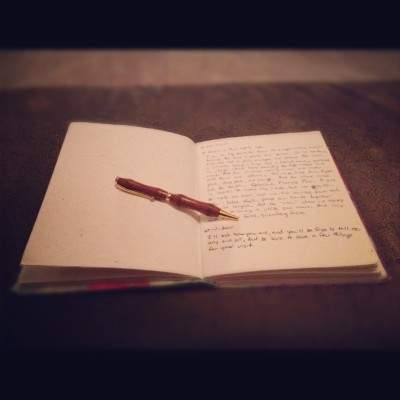Hopefully Lost
Not too long ago, a friend of mine, and talented, budding writer, came to me asking what she should do. She was having trouble knowing what to write next on her novel project, and despite having good themes and interesting characters, she wasn’t sure how to get from A to B. She is certainly not alone.

I have been writing a long time. I scratched out my first short story, albeit a very bad one, at eight years old, and since that first story, I too have struggled with what to scribble or tap out next, as do all who write (no matter if it’s fiction, essay, article, poetry, or academic paper). Sure we have an idea, but sometimes, the details and detours escape us. We know the destination but have no clue how to get there, and to boot, there’s no GPS, no map, no wise old man with a walking stick standing at the cross roads offering directions. I don’t have any sure fire way of helping others (or myself for that matter) know what comes next, but I have discovered a few tricks along the way. So if you’re writing and you’re not sure where to go, give a couple of these a try.
1) Hash out your characters…and when I say hash out I mean really get to know them. If you’re stuck on plot, you can always do some character development, even for the small ones. In turn, the character personalities can give you an idea of what happens next.
2) Think about it – a lot. I wrote most of the plot of The Kyla in my head while working in my grandparents’ vineyard. You don’t actually have to have a pen on paper or fingers on keys to be writing.
3) Ask your characters what happens. I was actually told to do this while I was defending my thesis, which was a short story collection. One of my committee members said that the final story seemed unfinished, and when I told her I didn’t really know what happened next, she told me to “ask Eric”. It was a beautiful bit of advice because it worked. And if that collection is ever published, it will have Eric’s ending.
4) Have projects back-burnered. At any one point in time, I have 3-5 projects I’m working on, and I try to have a variety of project types – a short story or two, a novel, a screenplay, as essay or article, a picture book. (Yes, those are all projects I have boiling right now.) Why? I found that sometimes I’m not in the right place to finish a project, whether my creative juices are tapped out, I’m not in the right mindset, or I’m not even in the right place in my life. Pressure can help you create some great work, but being forced can cause you to create a load of crap. Being able to rotate to another project means not being stagnant, and the stalled project has the opportunity to mature some.
5) Don’t be rigid. While writing one of the short stories in my thesis, stuff started blowing up. Literally. It just happened, and for most readers, it is the favorite story out of the collection. No, it didn’t go as planned, but because I give an impulse a chance, the story became the most memorable. Even if it’s crazy, write it down. If it doesn’t work, you can always choose to not use it later. But sometimes it works. Sometimes being good and lost gets you back on the right path.
6) Don’t throw ANYTHING away. File it away on a flash drive, throw it in a box, but don’t scrap it. Even if a project is never realized, you may be able to go back and use part of it or be inspired. My best writer friend recently published a short story that was a complete rewrite of one that didn’t quite “work”. It is nearly unrecognizable, but it is outstanding in its current form – one of his best.
Like travelers, writers don’t always know where to go. But perhaps we should take a lesson or two from the travelers – get to know your companions, calm down and think it through, ask for directions, don’t have just one destination planned, be open to diversions, and always keep your souvenirs.
Leave a Reply